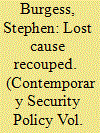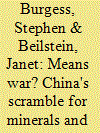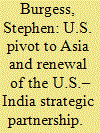|
|
|
Sort Order |
|
|
|
Items / Page
|
|
|
|
|
|
|
| Srl | Item |
| 1 |
ID:
123000


|
|
|
|
|
| Publication |
2013.
|
| Summary/Abstract |
A constitutional convention with representation from clan elders adopted a new constitution for Somalia on 1 August 2012, which paved the way for the election of a federal parliament and a new president of the Federal Republic of Somalia. This article examines two opposing explanations for this progress in a country long dismissed as a lost cause. Bottom-up stability, with grassroots equilibrium, is argued to be more likely to bring representation and renewal. The counter-hypothesis emphasizes security from the top down as more likely to lead to representation and renewal. Both hypotheses are evaluated here based on peacebuilding theory and evidence from Somalia and other relevant cases, including Afghanistan and the Democratic Republic of Congo (DRC). This review concludes that top-down security was possible and desirable in Somalia, paving the way for continued security efforts and stability work. The strategy of the African Union, European Union, and United States - supporting Burundi, Kenya, and Uganda with high-salience peace enforcement in Somalia - succeeded in bringing greater top-down security. The article explains that a combination of international assistance and training and increased combat effectiveness forced Al Shabaab out of Mogadishu and other urban centres. Western governments and international organizations continue to pursue top-down security as the best hope for ending war and restoring peace in Somalia. Top-down security, if properly implemented, can pave the way for bottom-up stability efforts and renewal and representation in Somalia, Africa, and elsewhere.
|
|
|
|
|
|
|
|
|
|
|
|
|
|
|
|
| 2 |
ID:
119252


|
|
|
|
|
| Publication |
2013.
|
| Summary/Abstract |
The tendency for rising powers to seek control of resource markets is being repeated in Southern Africa, where rising powers led by China are competing for strategic minerals. This could lead to market failure, shutting out Western companies. However, competition does not mean that armed conflict will occur. The global reach of the United States is such that it can take measures short of war to guarantee the flow of minerals. China will be at a strategic disadvantage for some time in relation to the United States and cannot assert control over the flow of minerals. The Southern Africa case shows that even in the era of globalization, monopolization and nationalization of resources will still be attempted, but those efforts are likely to be countered by global forces in favour of free markets. Rising powers like China may temporarily monopolize resources found on their own territory, but strong global forces will ensure that the flow of most resources continues. Monopolization is unlikely to work outside the territory of rising powers, because they still must rely on sea lanes to transport those minerals. The United States still has the ultimate trump in its navy, which can stop the flow of resources to any would-be monopolist.
|
|
|
|
|
|
|
|
|
|
|
|
|
|
|
|
| 3 |
ID:
141748


|
|
|
|
|
| Summary/Abstract |
India's national interest has been propelling the country toward becoming a valuable, cooperative partner with the United States. The growing power of China is pushing India to look for partners, especially the United States. The new Indian government, elected in May 2014, is committed to advancing India's national interests and growing India's power as a result of the changing balance of power in Asia. The government has brought a return of nationalism and closer relations with the United States. Therefore, U.S.–India relations are on track to develop more in line with the U.S. vision of an enhanced strategic partnership and an Indian role in the rebalance to Asia. India appears to be more willing and able to be a partner with the United States in the rebalance to Asia, including maintaining security and stability in the Indian Ocean region. To some extent, U.S. activity focused in Southeast Asia will be complemented by India's Look East policy and the U.S.–India Joint Strategic Vision for the Asia–Pacific and Indian Ocean region. There is the prospect of Indo-U.S. cooperation with Myanmar, Vietnam, and other states.
|
|
|
|
|
|
|
|
|
|
|
|
|
|
|
|
|
|
|
|
|